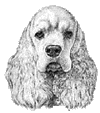 Seborrhea
Seborrhea
![]()
|
|
|
|
If your pet has flaky, dry or greasy skin and haircoat, he may have a condition called seborrhea. Seborrhea, in humans or animals, is caused by an abnormal "gearing up" of certain cells in the skin, including cells of the sebaceous (oil) glands and the basic skin cells. In seborrhea, the sebaceous glands (found in or near hair follicles, whose normal function is to enrich the skin with oil secretions) increase the amount and quantity of their secretions. An abnormal turnover of the skin cells (keratinocytes) into dead scale (keratin) also occurs. Normally the cells in the skin are constantly dying and being worn off, new cells to replace them from deeper in the skin. So there is a constant migration of deeper cells moving to the surface, undergoing keratinization (making keratin and dying), and being sloughed off. This migration usually takes 3 weeks. This cycle is changed in animals with seborrhea. The migration is greatly accelerated and only takes several days. Thus there is a buildup of this keratin on the surface of the skin. This is why seborrhea is commonly termed a "keratinlzation disorder". Seborrhea can be broken down into two groups, based upon the cause. Primary seborrhea can be either genetic-based or caused by a keratinization disorder. Secondary seborrhea is a result of other disease processes such as allergies, parasites, nutritional disorders, and endocrine (hormonal) disorders such as hypothyroidism. To determine the best treatment, it is important to differentiate whether a dog has primary or secondary seborrhea. Dogs with secondary seborrhea must be treated for its cause, such as allergies or zinc deficiency. Seborrhea is characterized by skin that is excessively flaky, 'and can be divided into several types depending upon the signs and symptoms. The two most commonly referred to are:
In addition to flakiness, dogs with seborrhea often have an increased odor and may tend to scratch and lick various parts of their body. Symptomatic treatments may include clipping or shaving the haircoat which will make shampooing much more effective since we need to get the shampoo down to the skin. Frequent shampooing with special medicated shampoos selected according to the type of seborrhea present (sicca or oleosa) are very important. In some cases, special rinses or ointments to flush out the hair follicles may be used. Essential fatty acid supplements are often given. This may seem counterintuitive since the coat may already be "greasy", however the fatty acids are essential for normal skin cell function and will help the condition, not exacerbate it. In cases of secondary seborrhea, the underlying cause should be diagnosed and appropriate treatment given as directed by your veterinarian.
|